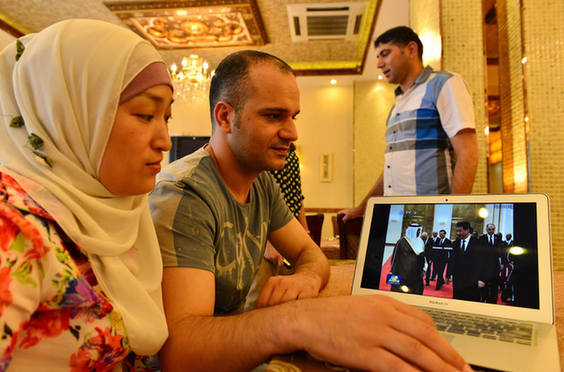A Young Arab’s Dream: Prosperity in China
By staff reporter LUO YUANJUN
At the opening ceremony of the Sixth Ministerial Conference of the China-Arab States Cooperation Forum last June, President Xi Jinping mentioned a Jordanian businessman who settled in Yiwu, a coastal city in Zhejiang Province. “The rapid development of relations between China and Arab countries drew their peoples together,” Xi remarked. “There is a Jordanian, Muhannad, in Yiwu where Arabic businesspeople congregate. He set up an Arabic restaurant, and prospered along with the city. He has since married a Chinese woman and settled in China. An ordinary young Arab, weaving his dream of life into the Chinese Dream of pursuing happiness, eventually reached success through hard work. This is the best example of the Chinese Dream meeting the Arabic Dream.”
Muhannad’s business is getting even better these days thanks to President Xi’s free “publicity.” He, his Chinese wife and two sons live happily with many friends nearby.
 |
|
Muhannand and Liu Fang watch the video of President Xi’s speech that mentioned him and made him famous. |
The “Ward” Restaurant
About a month after President Xi’s speech, I visited the Ward Restaurant on Chouzhoubei Road in downtown Yiwu. “Ward” means flower in Arabic, so locals also call it the Flower Restaurant. During Ramadan, the restaurant opens at seven o’clock in the evening. But all seats were occupied almost immediately and a TV interview was underway. “My restaurant is very popular now,” said Muhannad, “thanks to President Xi.”
Contact between China and Arab states can be traced back over 2,000 years. As Xi remarked, Sino-Arab relations were already well-established in antiquity. Trades flourished in the seventh century when merchants from Arabia and Persia came to China along the Maritime Silk Road, bringing goods as well as religious teachings. Some of them settled and multiplied, and their settlements gradually developed into Arabic communities. Many southern Chinese cities like Guangzhou, Hangzhou and Ningbo were home to Arabic communities.
Over a dozen centuries later, as China reforms and opens up, Yiwu, as one of the richest places in the country, has become one of the world’s largest small-goods markets. It is now a favored destination for visitors from the Arab world. Many Arabs jokingly call it a “village” of the Arab world.
“Over 10 years ago, I left Jordan and came to Guangzhou,” 36-year-old Muhannad says in fluent Chinese. “I helped my uncle in his restaurant where I met my wife Liu Fang. She is a translator in the restaurant.” In 2002, Muhannad married Liu Fang, a girl from Anhui Province.
It was also in 2002 when Muhannad’s uncle set up a branch in Yiwu, catering to the Arabs who flocked to the city for wholesale and trades. This is one of the first Arabic restaurants in Yiwu. In 2004, Muhannad and his wife took over the restaurant, and remodeled it after the 2008 financial crisis. They hired new chefs, updated the menu, and renamed it “Ward Restaurant.”
